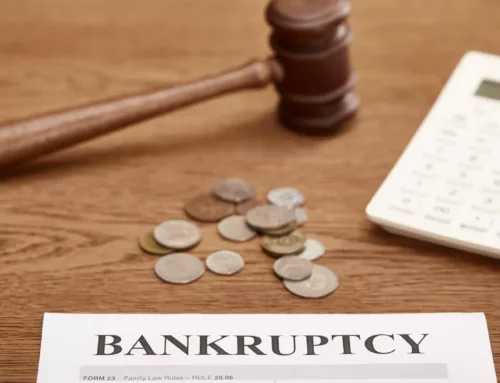Take The First Step Toward Financial Recovery
In the face of overwhelming debt, many individuals contemplate bankruptcy as a potential solution. While bankruptcy can provide a fresh start and eliminate burdensome financial obligations, it is a significant decision that should not be taken lightly. Understanding the nuances of bankruptcy law and evaluating your unique circumstances is essential before proceeding.
At Hammerschmidt Stickradt & Associates, located in Royal Oak, Michigan, we recognize the complexities of financial distress and the emotional toll it can take on individuals and families. Our team of experienced bankruptcy attorneys is committed to providing compassionate and personalized legal counsel to help you make informed decisions about your financial future.
We invite you to schedule a free consultation with our experienced bankruptcy attorneys. During this consultation, we will thoroughly assess your financial situation, discuss your options, and answer any questions you may have about the bankruptcy process, such as “When should I file for bankruptcy in Michigan?”
Short Summary:
- Bankruptcy is a legal process to help individuals or groups clear their debt or create a repayment plan.
- There are two common types of bankruptcy for individuals: Chapter 7 and Chapter 13.
- Chapter 7 bankruptcy eliminates unsecured debts like credit card debt and medical bills, but assets may be sold to pay creditors.
- Chapter 13 bankruptcy involves reorganizing debts into a payment plan over three to five years.
- Alternatives to bankruptcy include credit counseling, debt consolidation, debt settlement, informal debt negotiation, budgeting, and expense reduction.
The importance of being aware of what you can expect should never be taken for granted. Hammerschmidt Stickradt & Associates will see that none of your resources are wasted during your quest for debt relief. If you are looking for a skilled bankruptcy lawyer in Michigan to walk you through bankruptcy proceedings, call our law office today!
What is Bankruptcy?
Bankruptcy is a federal legal process by the United States government to help an individual or group clear their debt or create a plan to repay what they owe gradually. Contrary to what some people think, bankruptcy can be beneficial as it acts as a safety net for an individual, family, or business that owes a large sum of money. The federal courts are the ones handling all bankruptcy cases.
To be eligible for bankruptcy filing, you must appear before the bankruptcy court and follow any orders they give 180 days before filing. You should also attend a credit counseling session from an approved credit counseling agency within 180 days before submitting your petition unless you qualify for an exception. The counseling you’ll be given should tell you the answer to when you should file for bankruptcy.
What are the Types of Bankruptcy?
There are several types of bankruptcy chapters, but the two most common types for individuals in Michigan are Chapter 7 and Chapter 13.
- Chapter 7 bankruptcy, or liquidation bankruptcy, is the most common bankruptcy type. It can eliminate most unsecured debts, such as credit card debt, medical bills, and personal loans. In Chapter 7 bankruptcy, your assets are sold by a trustee, and the proceeds are used to pay your creditors. You may be able to keep some of your assets, such as your home and car if you qualify for certain exemptions.
- Chapter 13 bankruptcy, or reorganization bankruptcy, is designed to help you reorganize your debts and create a plan to pay them back over three to five years. In Chapter 13 bankruptcy, you keep your assets but must make monthly payments to a trustee, who will distribute the money to your creditors. You must also have a steady source of income to qualify for Chapter 13 bankruptcy.
In addition to Chapter 7 and Chapter 13, there are a few other types of bankruptcy chapters less common for individuals. These include:
- Chapter 11 bankruptcy is for businesses to reorganize their debts.
- Chapter 12 bankruptcy is for family farmers and fishermen to reorganize their debts.
- Chapter 9 bankruptcy is for municipalities to reorganize their debts.
If you are considering filing for bankruptcy, it is crucial to speak to an attorney to discuss your options and determine which chapter is right for you.
What are the Things I Should Know Before I File for Bankruptcy?
Before resorting to bankruptcy, consider these crucial points:
- Not all debts are eliminated in bankruptcy: Certain debts, such as student loans, child support, alimony, court fines, and penalties, will remain outstanding even after bankruptcy.
- Bankruptcy damages your credit score: Filing for bankruptcy indicates a potential credit risk, making it challenging to obtain loans, mortgages, or credit cards. Chapter 7 bankruptcy stays on your record for ten years, while Chapter 13 remains for seven years.
- Co-signers may be held responsible for your debts: In Chapter 7 bankruptcy, creditors can pursue co-signers for payment. However, under Chapter 13, creditors cannot go after co-signers if they adhere to your payment plan.
What are the Alternatives to Bankruptcy?
Declaring bankruptcy is often considered a last resort when facing overwhelming debt, but several alternatives to bankruptcy may suit your situation better. These alternatives can help you manage your debt, improve your financial situation, and avoid the negative consequences of bankruptcy.
- Credit Counseling and Debt Management Plans (DMPs): Credit counseling agencies provide financial education and guidance to help you manage your debt. They can also help you negotiate lower interest rates and create a debt management plan (DMP) to repay your debts over a set period.
- Debt Consolidation: Debt consolidation involves combining multiple debts into a single loan with a lower interest rate. That can simplify your payments and potentially reduce the total interest you pay over time.
- Debt Settlement: Debt settlement is an agreement between you and your creditors to settle your debts for less than the full amount you owe. That can be risky as it can damage your credit score and may not eliminate all of your debt.
- Informal Debt Negotiation: You may be able to negotiate with your creditors on your own to reduce your monthly payments or settle your debts for less than the full amount. That can be a good option if you have a good relationship with your creditors and are willing to negotiate.
- Budgeting and Expense Reduction: Creating a realistic budget and reducing expenses can help you free more money to pay down your debts. That may require changing your lifestyle, but it can be a sustainable way to manage your debt over time.
Remember, the best bankruptcy alternative will depend on your circumstances and financial situation. Carefully evaluating your options and seeking legal advice if needed is crucial.
When Should I Avoid Bankruptcy?
In certain situations, it’s advisable to delay filing for Chapter 7 or Chapter 13 bankruptcy. Prematurely filing could result in losing property that could otherwise be retained or necessitate filing for Chapter 13 instead of Chapter 7. Alternatively, you might be able to resolve your debt issues through other means, avoiding bankruptcy altogether.
Consider Postponing Bankruptcy if:
- Seeking Mortgage Modification: Bankruptcy can delay foreclosure, but filing too early can hinder mortgage modification prospects. Many lenders cease negotiations once bankruptcy proceedings begin. If mortgage modification is a possibility, explore it before filing for bankruptcy.
- Recent Income Reduction: When determining Chapter 7 eligibility, the court assesses your income over the past six months. If your income has recently decreased due to a pay cut or layoff, waiting a few months may make you eligible for Chapter 7. Your six-month average income may drop low enough to qualify if several months of lowered income are included in the means test.
- Protecting Property: If you have property you risk losing in a Chapter 7 bankruptcy filing, considering delaying the filing could allow you to retain or sell the property and utilize the proceeds.
- Expecting New Debts: Avoid filing for bankruptcy if you anticipate significant expenses in the near future. Chapter 7 typically eliminates debts existing at the filing date. Future debts will remain your responsibility. For instance, if you anticipate knee replacement surgery and will incur expenses, delay filing until after the surgery to eliminate those debts.
Before making any decisions regarding bankruptcy, it’s crucial to consult with an experienced bankruptcy attorney. They can assess your specific situation, advise on the most suitable course of action, and guide you through the bankruptcy process effectively.
Call our Michigan Bankruptcy Attorney Now!
Whether or not you already know the answer to when you should file for bankruptcy, your choice will determine your financial situation for the next few months or years. That’s why having great legal representation is essential when deciding to go through bankruptcy.
Aside from giving you the answer to “When should I file for bankruptcy in Michigan?,” Hammerschmidt Stickradt & Associates also offers excellent debtor education and reliable legal advice on the following practice areas: automatic stay in bankruptcy, abusive creditors, stopping foreclosure, and wage garnishment.
Call us for a FREE consultation, and we’ll do our best to help fix your problems!



